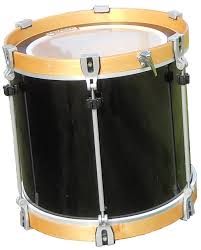drum
英 [drʌm]
美 [drʌm]
- vt. 击鼓;大力争取
- vi. 击鼓;大力争取
- n. 鼓;鼓声
- n. (Drum)人名;(英)德拉姆;(德)德鲁姆
使用频率:

记忆方法
为了记忆单词“drum”,可以将其与“room”结合起来记忆。想象一个“room”(房间)里有“drum”(鼓),通过视觉化的方式记住“room”和“drum”之间的关系。这样,每次想到“room”时,你就能联想到“drum”。
以上内容由AI生成, 仅供参考和借鉴
中文词源
drum 鼓
拟声词,模仿敲鼓的声音。
英语词源
- drum
-
drum: [16] Belying the total lack of similarity between the instruments, drum, trumpet, and trombone seem to be closely related. Drum appears to be a shortening of a slightly earlier English word drumslade ‘drum, drummer’, which was borrowed from Low German trommelslag ‘drumbeat’. This was a compound noun formed from trommel ‘drum’ and slag ‘hit’ (related to English slay).
An alternative view is that English simply acquired the word from Middle Dutch tromme. Both these Germanic forms meant simply ‘drum’, but the picture becomes more complex with Middle High German tromme ‘drum’, for originally this had the sense ‘trumpet’, and what is more it had a variant form trumbe (its ancestor, Old High German trumpa, ultimate source of English trumpet and trombone, only meant ‘trumpet’).
So the picture that emerges is of a word that originally referred in a fairly undifferentiated way to any musical instrument that made a loud noise.
=> trombone, trumpet - drum (n.)
- 1540s, probably from Middle Dutch tromme "drum," common Germanic (compare German Trommel, Danish tromme, Swedish trumma), probably of imitative origin. Not common before 1570s. Slightly older, and more common at first, was drumslade, apparently from Dutch or Low German trommelslag. Machinery sense attested from 1740, from similarity of shape.
- drum (v.)
- 1570s, from drum (n.). To drum (up) business, etc., is American English 1839, from the old way of drawing a crowd.
权威例句
- 1. As he sang he kept time on a small drum.
- 他边唱边和着节拍敲一个小鼓。
- 2. The trade secretary disagreed but promised to "bang the drum for industry".
- 贸易部长并不同意,但是答应会“为产业界摇旗呐喊”。
- 3. The drum is one of the oldest musical instruments.
- 鼓是最古老的乐器之一。
- 4. We've leafleted the university today to try to drum up some support.
- 我们今天在大学散发了传单,希望能争取到支持。
- 5. The new government seemed rather hum-drum.
- 新政府看起来平庸无能。